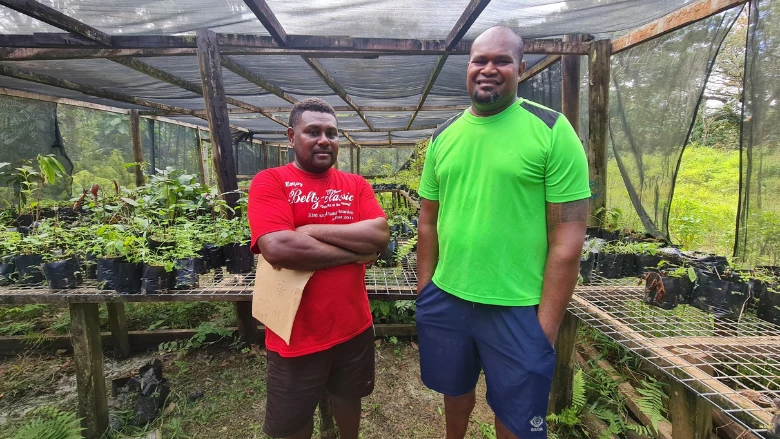 Nadroumai Village headman, Jovesa Vaileba (left) pictured here with village spokesman, Ravuwame Kunavula (right) in their community plant nursery. © World Bank
Nadroumai Village headman, Jovesa Vaileba (left) pictured here with village spokesman, Ravuwame Kunavula (right) in their community plant nursery. © World Bank
It’s 2pm on a sunny and humid afternoon in Fiji. Our team has just arrived in Sigatoka, a seaside town on a well-traveled section of the Queens Road, the main road that loops around the coast of Fiji’s main island, Viti Levu. We arrive in Nadroumai village, a small rural community surrounded by a lush tropical forest, birdsong, and the gentle burble of a nearby creek – and home to some very inspiring stories about community resilience, deep connection with nature, and responsibility.
Our welcoming host and village head, Jovesa Vaileba, and the village spokesman, Ravuwame Kunavula, walk us to a community plant nursery where native tree plants are grown with support from various donors and national agencies, including the Fijian government’s Jobs for Nature program, which provided communities like Nadroumai with small grants for environmental restoration and rehabilitation. Jovesa tells us of how their village members would come together every Monday to tend to the nursery, to work with local buyers (mostly nearby oceanside resorts) and to manage the community’s small investment in nature.
Following the visit to the nursery, we walk together to the creek through a trail in the woods, where Ravuwame shows us the waterline on the side of a gigantic tree trunk recorded during a recent flood. The line which used to be at about waist height, was now at least four to feet higher for the first time in the history of the village as rains are becoming heavier and more frequent. They point out an area of light-green grass growing on the opposite side of the creek: this patch of vetiver grass recently planted by the community, supports the creek’s eroded coastline. We continue our walk through the woods, protected by the shade of gigantic – and invasive – African tulip trees, standing trunk-to-trunk alongside their smaller, gentler native Fijian counterparts that were also planted by villagers in an effort to rebalance the forest’s fragile ecosystem and support reforestation.
The record water level and invasive trees around Nadroumai are stark reminders of the environmental challenges rural Fijian communities face today , driven by climate change and other climate related emergencies which are some of the biggest threats to Fiji’s rich and diverse natural resources, livelihoods and economic development. Average asset losses due to cyclones and floods are estimated at more than FJ$500 million (approximately US$227 million) per year, or about five percent of Fiji’s GDP. Additionally, the pandemic has taken an unprecedented toll on the country’s economy, leading to mass closures of businesses and significant unemployment.
Since 2020, the World Bank has been supporting the Fijian Government – through the Fiji Social Protection COVID-19 Response and System Development Project – to address the socio-economic impacts of the pandemic and recurring natural disasters. This includes support for cash assistance for those who became unemployed or underemployed as a result of COVID-19, and support to Fiji for programs – known as “adaptive social protection” – to help the government build the resilience of vulnerable families to prepare for, cope with, and adapt to future shocks like natural disasters, economic crises, or even future pandemics.
In Nadroumai, Jovesa and Ravuwame shared inspiring stories of how the community came together to support many who had faced unemployment when coastal resorts were forced to close due to the pandemic.
“Many members of our community working in these nearby resorts were really affected when their source of income was suddenly gone. Another source of income for the village was coming from the sales of plants to some of these coastal resorts and the eco-tours that we used to run before COVID hit and all the borders were closed to tourists,” says Jovesa.
“But we’re grateful for government programs like Jobs for Nature that helped pave the way for the whole community to get involved in activities to build climate change resilience; generate some much needed income and at the same time help us take better care of what we’ve been blessed with in nature and that benefit the village as a collective.”
Fijian communities like Nadroumai have been leading by example in using initiatives like Jobs for Nature proactively to benefit the whole community. As a result, the World Bank-funded Jobs for Nature 2.0, which builds on the lessons learned during the program’s first iteration during the pandemic, is taking things even further to help strengthen resilience in most at risk communities in Fiji.
As Fiji begins a new stage in its recovery from the pandemic, Jobs for Nature 2.0 will support up to 10,000 people – particularly those in vulnerable communities, especially women and youth - who will receive short-term employment opportunities and skills trainings in wetlands protection, riverbank rehabilitation, coastal bank protection or biodiversity enhancement projects; with the aim of delivering both important employment opportunities while addressing climate resilience needs.
Nadroumai is just one of hundreds of communities in Fiji that have an important story to share with others around the world about the very real impacts of climate change and showcasing how innovative projects like Jobs for Nature 2.0 can support and empower vulnerable communities to generate income; reduce the impacts of and be better prepared for future climate related emergencies; and deepen the profound appreciation of and responsibility towards nature and all other community members’ wellbeing because vei lomani – which means caring for and nurturing – is the Fijian way.

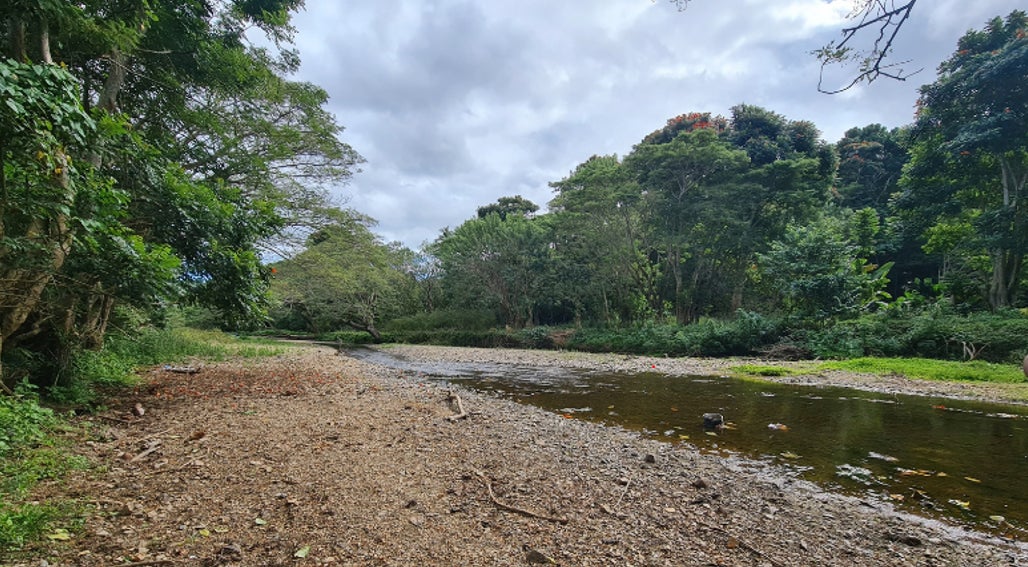
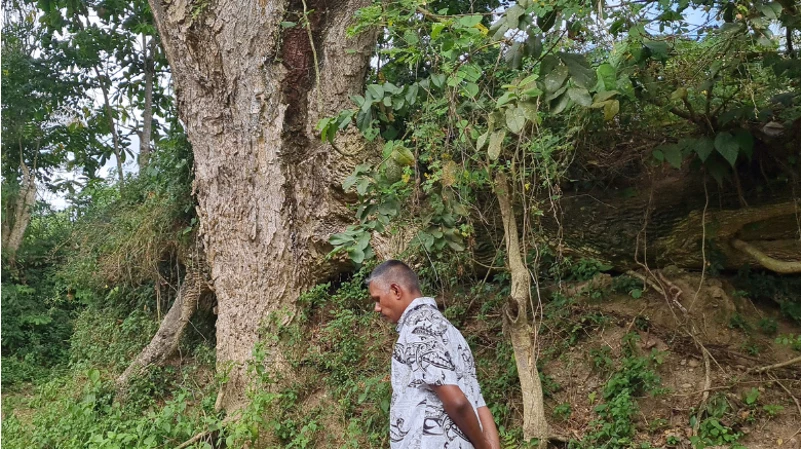
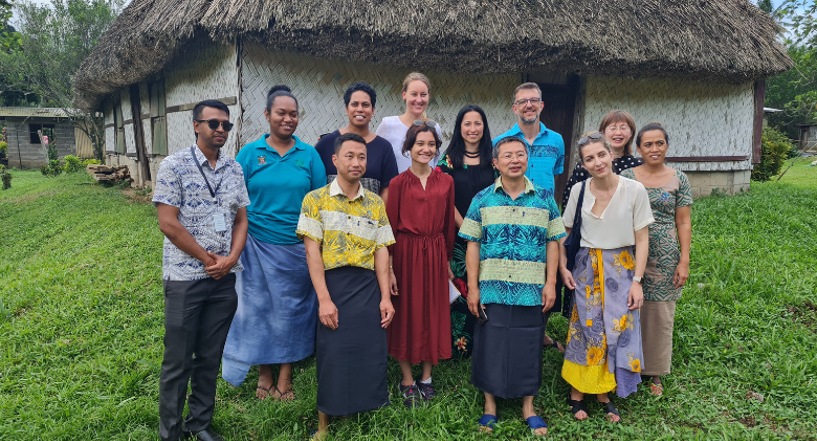
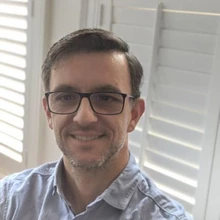
Join the Conversation